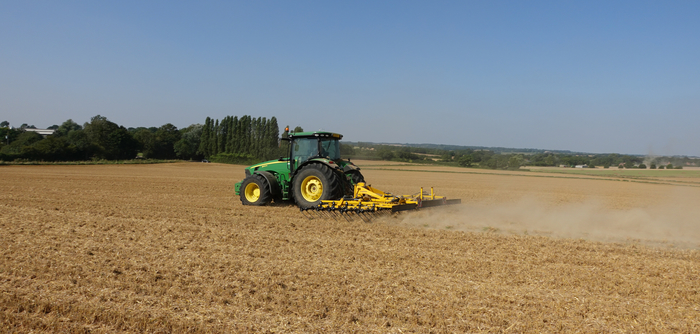A recent survey has found that 75% of UK farmers feel regenerative techniques are important to the future of farming. A further 67% of those surveyed believe that regenerative farming methods are important now. The survey was conducted by AMTEC, a leading UK supplier of used agricultural machinery.
The farm machinery provider recently conducted a survey amongst its customers to gauge current opinion on the regenerative agriculture movement that is sweeping the industry.
In order to inform their supply of used farm equipment, AMTEC asked their customer base several questions to see whether the movement was popular with farmers, why that might be, and what barriers farmers face when it comes to adopting regenerative agriculture processes.
Min-till systems
As part of the survey, AMTEC found that 46% of farmers use min-till systems, that reduce fuel use, are beneficial for the environment and help to boost soil health. However, 29% still use traditional ploughing and deep tillage methods, and only 18% were truly direct drilling. This shows that although there is a lot of talk around the switch of methods it is a large step for farmers to take and there is still a place for traditional cultivation on some farms.
72% of farmers say that they are already looking to use some regenerative techniques on their farms, and so AMTEC’s available range of second-hand machinery should reflect this.
But what’s the motivation from the farmer’s point of view?
- Nearly 50% of farmers said that the main motivation behind starting to use regenerative techniques was to improve their soil health and drainage, which in turn would allow for better crop yields.
- 16% of the farmers surveyed said their main motivation was to help care for the environment and reduce CO2 emissions, and 14% said that it was so they could benefit from government grants which are associated with sustainable farming.
- 21% of farmers said that the main motivation for starting regenerative agriculture was to reduce their input costs. Paying less for fertiliser and fuel by looking after the soil and using direct drilling techniques would be of benefit to many farmers. This has become even more important with the sharp increase in costs over recent months.
When asked about the main barriers to starting with regenerative techniques, 27% of farmers cited a lack of funding as their main problem. Whilst the government provides grants for using sustainable practices, and 95% of surveyed farmers are aware of them, the suggestion is that there could be more financial support available.
Meanwhile, 28% of farmers surveyed said that the main issue holding them back was a lack of knowledge about regenerative farming practices. In response to this, AMTEC has recently launched its new Future of Farming knowledge hub, which provides information on the science behind regenerative agriculture and how to start using the methods.
Commenting on the findings, Jason White, marketing manager at AMTEC, said: “What this survey shows is that more farmers are looking at adopting regenerative farming methods, with a strong motivation around improving soil health and drainage to improve crop yield.
“With the current inflationary cost pressure, and with a clear desire to reduce input costs, farmers will be looking at every option to enable them to make changes in an economically viable way. We will continue to provide high quality used machinery at competitive prices to support farmers in farming efficiently, no matter what production methods they choose.”




